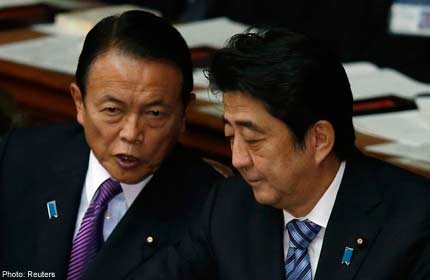Japan debates proposed secrecy law

JAPAN'S Lower House begins deliberations today on a controversial Bill designed to give the state sweeping powers to protect secrets, ranging from Fukushima- like nuclear crises to international trade talks.
Bureaucrats who are charged with leaking secrets could face up to 10 years in jail, just like military personnel who now face similar punishment under military law. Conspirators face up to five years in jail.
The proposed law "damages the public's right to know", Mr Banri Kaieda, leader of the opposition Democratic Party of Japan (DPJ), told reporters on Tuesday.
The government argues that the proposed law is necessary to win the trust of other countries. In particular, such a law would ensure that Washington will be willing to share with Tokyo the sort of information needed for the proper functioning of a US-style national security council to be set up in January.
Although the ruling coalition has the numbers in both Houses of Parliament to pass the Bill, a coalition lawmaker has indicated that the government is willing to consider revisions to the draft legislation from the Opposition.
Critics say the lack of checks on what the government actually does with a piece of information could encourage it to over-classify, or suppress information that could prove embarrassing if made public.
The opposition DPJ has proposed the inclusion of a check mechanism whereby a court will act as a third party to determine whether the government has acted appropriately in classifying information.
The Bill aims to empower the government to designate as official secrets information in four broad areas - diplomacy, security, spying and terrorist activities.
Reports say the Bill is expected to cover some 400,000 items.
There are also fears that the proposed law could make bureaucrats wary about cooperating with journalists.
Once the Bill is passed, the government will name a panel to work out criteria for classifying information.
Although the proposed law puts the responsibility for classifying secrets on a minister or head of an agency, the sheer volume of information involved means that, in practice, junior officials will have to do the actual classifying.
The country's major dailies have pointed out the potential for arbitrariness in applying the proposed law.
For instance, an aide to the prime minister wrote on his blog that "it should be instantly obvious to anyone that the proposed law will not apply to information related to nuclear reactors".
But an official who briefed a group of opposition lawmakers on the proposed legislation told them it was "possible" that the security of nuclear facilities could be classified secret.
"To prevent the arbitrary application of the law," said the largest-circulating Yomiuri Shimbun daily, "the government will need to devise criteria that strictly define what can be considered secret."
Japanese voters are wary of the government's latest move.
While a recent survey by Kyodo News found that 35.9 per cent of voters were behind the Bill, as opposed to 50.6 per cent against it, an overwhelming 82.7 per cent urged the government to move cautiously and not rush into enacting the law during the current parliamentary session, which ends on Dec 6.
wengkin@sph.com.sg

Get a copy of The Straits Times or go to straitstimes.com for more stories.